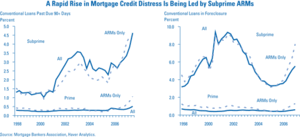I’m not getting this question nearly as much as I used to… but it is still a valid question for many “would-be” buyers (or sellers)…
Should I improve my current home, or just buy a new one?
It isn’t nearly as easy of an answer as it might first seem. Here is my take on it 3 years ago. But there are some changes… Read the old post if you have a moment, then come back and finish this one. I’ll give a few highlights.
Let’s say that you live in a house that has eroded from $250,000 to $225,000 (10%), and you are looking at a house that went from $500,000 to $450,000 (also 10%). If you took the $25,000 loss on your existing home, you would save $50,000 on the step up home. So, you are $25,000 ahead.
Well… the house that you might have taken a 10% loss on 3 years ago might be staring at a 25-30% loss now… maybe more, maybe less. But (this is important) that might be starting to change… might… depending on your neighborhood and even the style of house. So, we might start seeing some of those great deal disappearing. At the same time, we might find that a few more prospective sellers can get out of their current home without losing their shirts. If you can’t afford to sell, then the deals are irrelevant.
Also, in the old post I mentioned interest rates… they were around 6% then, and they are around 4.5% now. This CAN’T last.
Combining these two items, home affordability hasn’t been better in a VERY long time. But, you still have to be in a position to make the move… be able to sell your home (and either have equity or the ability to pay off the balance.
Also in the old post I talked about not building too far outside of the “neighborhood norms”. If the average house in your neighborhood is a 3-4 bedroom, 2-3 bath ranch, building a 6 bedroom two story home is NOT going to pay you back. I’m not saying that you can’t do it (but check local ordinances and covenants, THEY might say you can’t), I’m saying that you shouldn’t expect to be able to sell it without pain.
Even if you NEVER plan to sell the house, think about resale. I have sold more than one “I’m never going to move from here” homes for sellers. Life changed and so did their needs. They went and bought new “I’m never going to move from here” homes. Even if you are right… you are never going to move from here, at some point, somebody in the family is likely to sell the house.
If you decide that you want to move up (or down or sideways), give me a call.
Related articles
- Wayback Wednesday… Buyers and Sellers, Same Advice… (lanebailey.com)
- Wayback Wednesday… A Foreclosure Mitigation Too Good to be True… (lanebailey.com)













